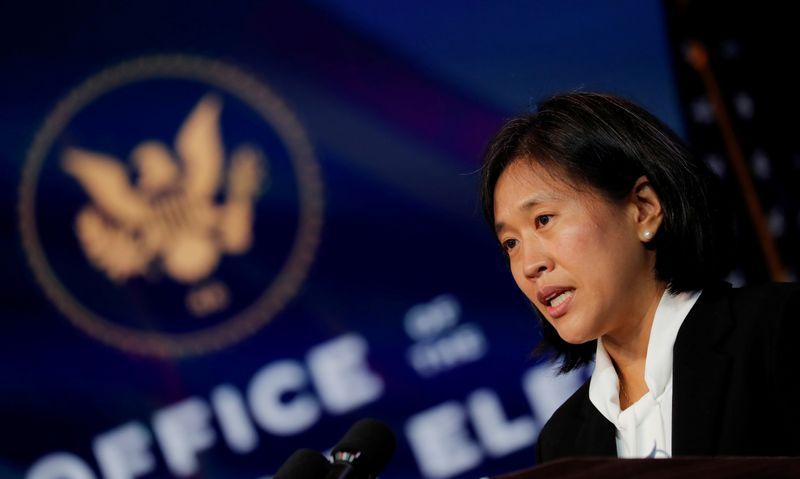By David Lawder and Andrea Shalal
WASHINGTON (Reuters) - Katherine Tai, President Joe Biden's top trade nominee, backed tariffs as a "legitimate tool" to counter China's state-driven economic model and vowed to hold Beijing to its prior commitments, while promising a sweeping new approach to U.S. trade.
At her Senate confirmation hearing to become U.S. Trade Representative, Tai also called for a revamp of global trade rules to eliminate what she called "gray areas" exploited by China and end a "race to the bottom" that she said had hurt workers and the environment.
"For a very long time our trade policies were based on the assumption that the more we traded with each other, and more liberalized our trade, the more peace and prosperity there would be," Tai said, adding that trade liberalization in the past too often led to less prosperity, and lower labor and environmental standards.
Tai's testimony to the Senate Finance Committee is the latest sign that Washington's approach to overseas commerce may have changed permanently, after decades of market-based "free trade" liberalization that benefited multinational corporations but was upended by former President Donald Trump's protectionism.
Tai did not reject Trump's "America First" trade policies, but said she would revamp them to a "worker-centric" trade model that aimed to safeguard American livelihoods through investment and trade enforcement.
The Yale and Harvard Law School educated daughter of U.S. immigrants from Taiwan, Tai called China "an extremely formidable competitor where the state is able to conduct the economy almost like a conductor with an orchestra."
The United States needs to respond with more strategic investments, supply chain resilience and trade enforcement to counter Beijing's strategy and ambitions, Tai said.
Tai said China needed to live up to its commitments under the Phase 1 trade deal it signed with the United States in early 2020, but she gave few specifics on how she would achieve this besides using existing enforcement tools.
She made no new tariff threats.
"There are also a lot of areas that are gray areas, where the rules are not clear, or where we don’t have rules yet," Tai said, adding that the United States should work with other countries to explore new options to seek structural changes in China.
Asked about tariffs on steel and aluminum, Tai said tariffs were a "legitimate tool in the trade toolbox" but that "a whole slew of policy tools" were needed to address the core problem of global excess production capacity for the metals, centered primarily in China.
Jamieson Greer, a trade lawyer who served as chief of staff to Tai's USTR predecessor, Robert Lighthizer, said he interpreted Tai's views on tariffs as continuing the Trump administration's stance.
"From the testimony today, it’s clear that the Biden administration does not view tariffs as a moral issue. You have to be careful, but they’re a tool that can be used," Greer said.
Tai's testimony has been anxiously awaited for months by industry, U.S. trading partners from Beijing to Brussels, labor groups and lawmakers - all lining up to lobby the trade chief for the world's largest economy..
If confirmed, as is widely expected, Tai faces a long list of Trump-era tariff disputes to resolve, including on aircraft, food and wine with Europe to threatened duties over digital services taxes and China's lagging U.S. goods purchases.
STRENGTHENING U.S. SUPPLY CHAINS
Tai told senators that legal tools are needed to better protect American intellectual property besides the "Section 301" trade law used by the Trump administration to wage a tariff war against China.
A key priority is assessing China's use of forced labor in the Xinjiang province Tai said, adding: "the use of forced labor is probably the crudest example of the race to the bottom" in global trade. Beijing denies that it uses forced labor.
Achieving Biden's trade goals would require stronger, more resilient U.S. supply chains and investments in people and infrastructure to boost American competitiveness, she said.
Tai also rejected a direct return to an 11-country Asia-Pacific free trade deal that originally included the United States, saying the world had changed significantly since the Obama administration agreed to it in 2015. The U.S. Congress never ratified the deal.
But she said the United States would cooperate with other countries in Asia on trade, and work to improve the World Trade Organization's effectiveness. Tai also said she would prioritize enforcement of the U.S.-Mexico-Canada trade agreement, which she helped renegotiate in 2019 as trade counsel for the House of Representatives Ways and Means Committee to include tougher labor and environmental standards.
She said the deal marked an "important step in reforming our approach to trade" and that its success was vital.
